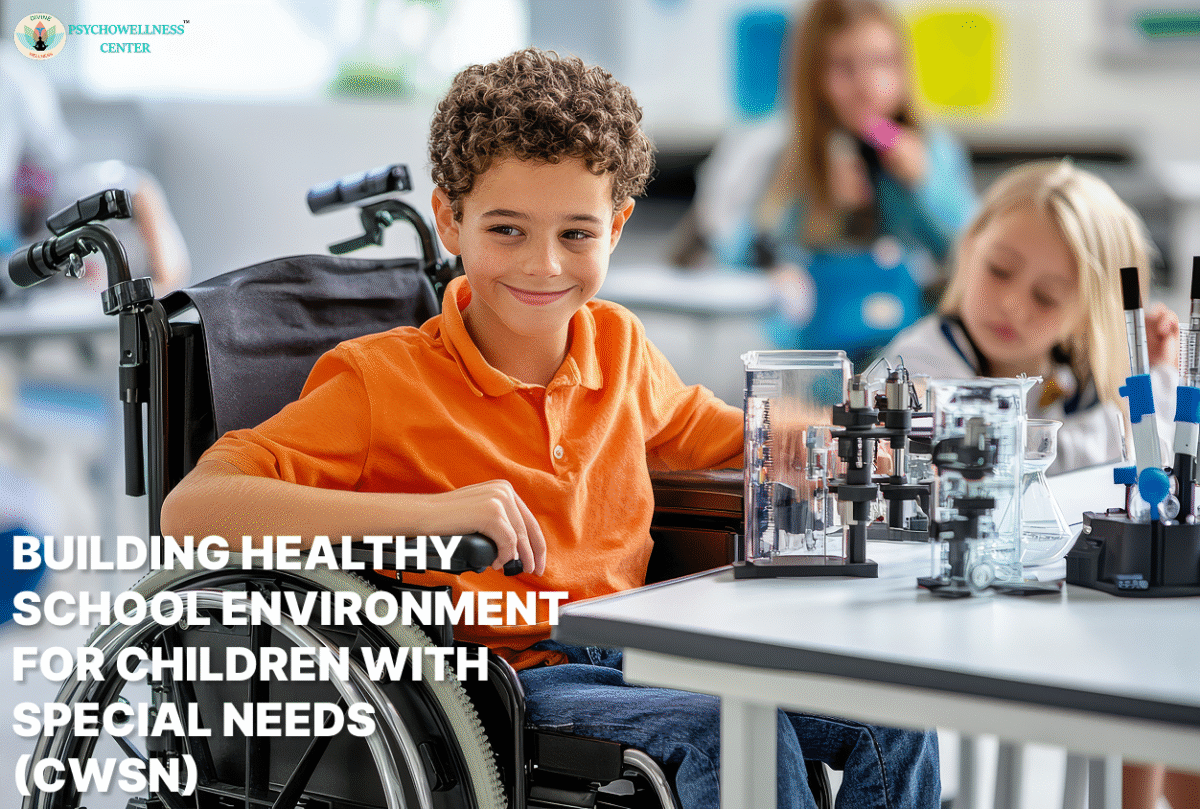All children, but especially Children with Special Needs (CWSN), benefit greatly from a school atmosphere that is safe, inclusive, and supportive. Emotional safety, supportive connections, individualised learning, and fair access to opportunities are all components of a successful school environment that go beyond the physical infrastructure. When thoughtfully implemented, these factors collectively promote academic success, emotional well-being, and social inclusion for CWSN.
Understanding the Needs of CWSN
Children with Special Needs include those with physical, intellectual, emotional, behavioural, or learning disability challenges. These children often require tailored educational strategies, therapeutic interventions, and a highly supportive school climate. A healthy school environment for them should accommodate their unique needs while empowering them to thrive with dignity and confidence.
Key Components of a Healthy School Environment for CWSN
1. Inclusive Policies and Leadership
Develop and enforce inclusive school policies aligned with the Right to Education Act (RTE) and National Education Policy (NEP). School leadership should champion diversity & inclusion, set clear expectations for inclusive practices, and allocate resources accordingly.
2. Physical Accessibility
Ensure that school buildings are accessible, including ramps, handrails, elevators, adapted toilets, and wide doorways. Classrooms should be spacious enough to accommodate mobility aids and include adaptive furniture when needed.
3. Safe and Supportive Climate
Establish a culture of respect, empathy, and zero tolerance for bullying or discrimination. To promote empathy and lessen stigma, educators and students should get disability awareness training. Provide mental health support through counsellors or school psychologists trained in special education.
4. Individualised Educational Support
Develop and regularly review Individualised Education Plans (IEPs) for each child based on assessments and family inputs. Employ special educators and therapists (e.g., speech, occupational, behavioural) to support academic and functional skill development. Use differentiated instruction, assistive technology, and multi-sensory teaching strategies tailored to the learning styles of children with developmental delay or other special needs.
5. Professional Development for Teachers
Regularly train general and special educators in inclusive pedagogies, classroom management for neurodiverse learners, and handling behavioural challenges. Encourage collaboration among staff to share best practices and problem-solve individual concerns.
6. Peer Inclusion and Socialisation
Encourage peer mentoring programs where typically developing students assist or buddy with CWSN. Promote cooperative learning, group activities, inclusive sports, and co-curricular events that build social bonds and reduce isolation.
Such initiatives can be especially helpful for students with communication disorders, helping them develop verbal and non-verbal communication skills in real-life scenarios.
7. Family Involvement
Conduct regular parent-teacher meetings, workshops, and counselling sessions to equip families in supporting learning at home. Involve families in goal-setting, decision-making, and feedback loops about their child’s education.
8. Health and Safety Measures
Maintain emergency evacuation protocols that include provisions for children with physical or sensory disabilities. Provide regular health screenings, hygiene education, and ensure medical needs (such as seizure management or feeding support) are adequately addressed.
Benefits of a Healthy School Environment for CWSN
- Improved Academic Outcomes
With the right support, children show significant progress in reading, writing, specific learning disabilities, communication, and life skills.
Increased Self-Esteem and Confidence
Feeling accepted and supported enhances their self-confidence and motivation.
- Stronger Social Skills
Inclusive settings foster peer interaction, collaboration, and social competence. Children with autism and other conditions often develop better interpersonal skills in such environments.
- Better Emotional Regulation
A safe, structured environment helps in managing stress, anxiety, and emotional dysregulation often associated with certain disabilities.
Incorporating play therapy and mindfulness therapy within the curriculum can also aid in emotional development and behavioural control.
Challenges in Implementation
While the vision of a healthy environment is compelling, schools often face challenges such as:
- Inadequate funding or infrastructure
- Shortage of trained special educators
- Absence of awareness leading to resistance to inclusion
- Overcrowded classrooms limit individualised attention
Addressing these requires systemic changes, collaboration with NGOs, government schemes like Samagra Shiksha, and community sensitisation.
Conclusion
Building a healthy school environment for CWSN is not merely an act of compliance, but a commitment to educational equity and human dignity. It reflects a society’s values, compassion, acceptance, and justice. By adopting inclusive frameworks, investing in teacher training, creating emotionally safe classrooms, and empowering families, we can ensure that every child & adolescent, regardless of their abilities, gets the opportunity to flourish. Let us move towards schools that don’t just accommodate difference, but embrace it, where social comparison gives way to cooperation, and every learner is seen not through their limitations, but through their limitless potential.
There is assistance available if you are prepared to act but are unsure of where to begin. TalktoAngel offers online counselling with expert psychologists who can help your emotional growth, self-awareness, and behavioural change, all from the comfort of your home. Prefer face-to-face support? The experienced therapists at Psychowellness Center in Janakpuri and Dwarka Sector-17, Delhi, offer compassionate offline counselling to guide families of CWSN. If you’re looking for the best psychologist near me to support your child’s educational and emotional journey, these resources can help turn insight into action and challenges into achievements.
This article, enriched with insights from Clinical Psychologist Dr. R.K. Suri and Counselling Psychologist Ms. Drishti Rajore, presents their professional viewpoints on strengthening lasting emotional resilience and adopting effective coping strategies.
References
Sharma, U., Loreman, T., & Forlin, C. (2012). Measuring teacher efficacy to implement inclusive practices. Journal of Research in Special Educational Needs, 12(1), 12–21. https://doi.org/10.1111/j.1471-3802.2011.01200.x
UNESCO. (2020). Global education monitoring report 2020: Inclusion and education – All means all. UNESCO Publishing. https://unesdoc.unesco.org/ark:/48223/pf0000373718
American Psychological Association. (2013). Neurodevelopmental disorders. In Diagnostic and Statistical Manual of Mental Disorders (5th ed., pp. 31–86). https://doi.org/10.1176/appi.books.9780890425596
How to Foster Mental Health and Well-Being in School Students – Psychowellness Center
Poor School Performance | Disruptive Behavior – Psychowellness Center

